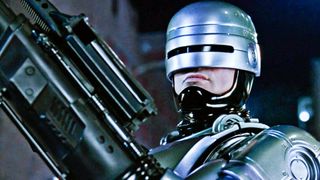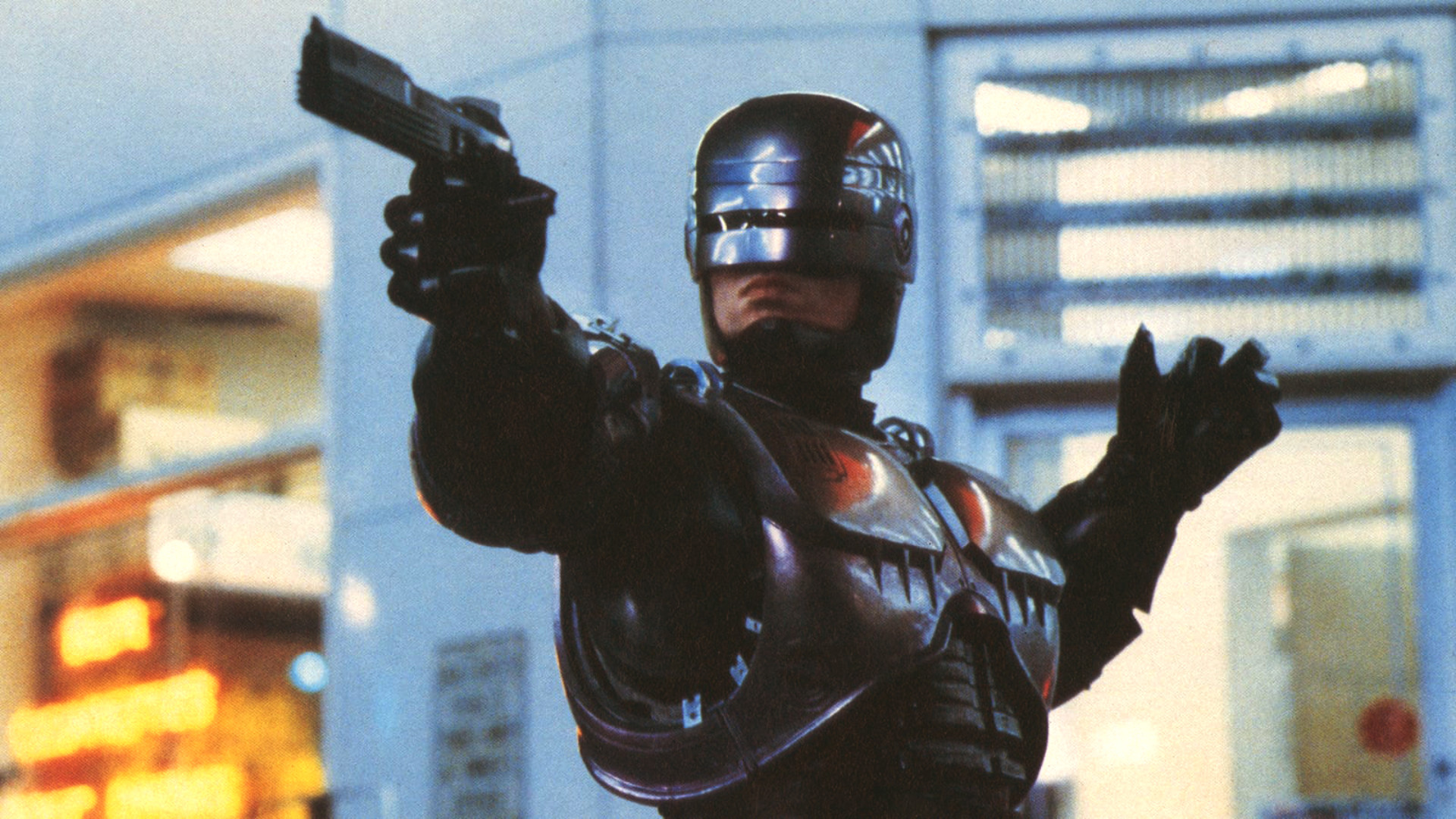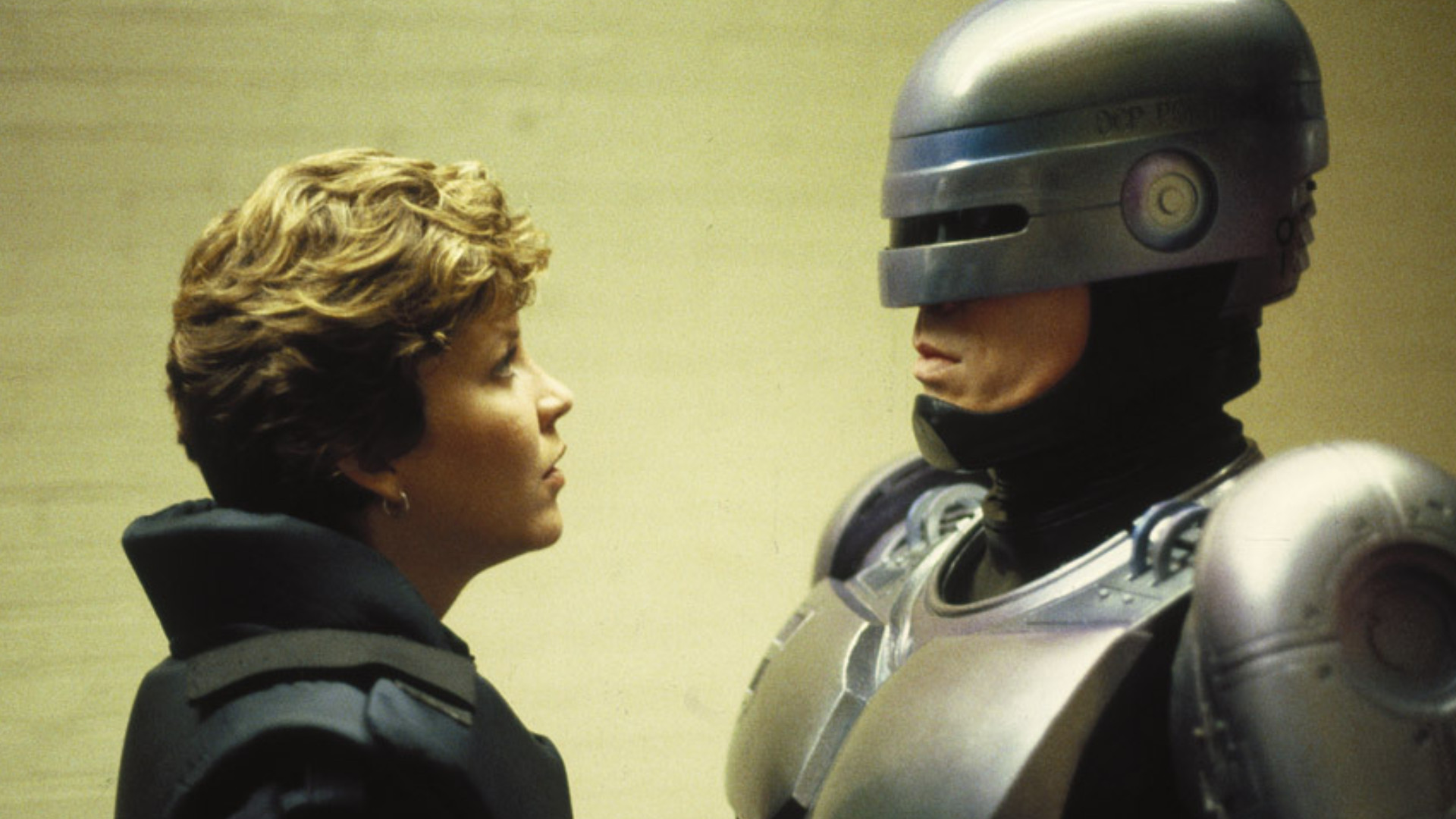RoboCop revisited: Paul Verhoeven on how a low-budget sci-fi satire spawned a fan-favorite franchise - oakeshispers
RoboCop revisited: St. Paul Verhoeven on how a low-budget sci-fi caustic remark spawned a fan-favorite franchise

Wizard Wars. The Avengers. Harry Potter around. When we look on entertainment empires, an inexpensive, ultra-intense, sociopolitical irony from the late '80s doesn't immediately come to mind. But, like its hero Alex Murphy, RoboCop has tested very petrified to kill.
Screenwriters Ed Neumeier and Michael Miner's story of a cybernetic cop built using the body of an officer slain along obligation latched onto fears about runaway Reaganomics, the overturning of ideals about the mutual good and uncertainty about robots and computers.
Every bit Neumeier tells SFX from his home in suburban Los Angeles, they were themes he was surprisingly knowledgeable most growing astir. "1970s Northern California was pretty tolerant. It was infused with those ideas, soh I hot to horn in merriment at them," he says. "It was nice when audiences were in on the joke. Paul [Verhoeven, director] identified information technology in the script and made it yet clearer."
Working as a studio development executive at the meter, Neumeier wrote RoboCop together with student filmmaker Michael Mineworker. The script found its way to manufacturer Jon Davison, flying high at the time. "He'd had success with Airplane! indeed he wasn't afraid of the humour," Neumeier says. "Everybody was iffy about it, only non Jon. He apprehended you could make something funny, political, dramatic and exciting at the same time."
Davison took it to picture production permanent Orion, and soon RoboCop had a green light. Some directors desirable it but couldn't docket it, others didn't feel like a good fit to Davison, and a Dutch conductor renowned for really full-grown European dramas didn't seem the least bit suited. Initially, Verhoeven agreed.
"I read about 15 pages and threw IT away. It was so FAR away from the films I'd made. They were much more based in reality and certainly non science fiction," the theater director says from his home in The Hague. "That subtitle, 'the forthcoming of law enforcement', seemed completely alien to me."
So Verhoeven passed... until his wife caused him to reconsider. "She read it in a whole unusual way: she felt on that point were elements that weren't so farthest away from me, like [Murphy] losing his medieval, and the school of thought of losing your memory."
A fast call to his US agent and history was written. "Even my films in Holland, if they were about a state of war, none of them were fulfill movies. I was more interested in the philosophical underpinnings of the book. I saw RoboCop a bit like a futuristic Jesus."
Police Statements

The result is a seeming contradiction in terms between brawny action and high-minded comment along social dangers. "I wanted a movie you could see at eight years old and think out IT was the superlative robot movie ever, then at 28 and see information technology was about other things," Neumeier says.
He adds that atomic number 2's e'er "out of sight behind" genre to comment on the world, something that's easier to swallow with the musical style tropes of action or laughs. "[Characters] are exhibiting certain behaviours that are amusing but hind end also equal vulnerable, evil and corrupt. It was a difficult spirit to describe to people." Neumeier says Verhoeven's relaxed position towards the ferocity was another plus. "There's a torture-murder on page 22; the script e'er had that edge. At first Paul wasn't sure nearly it existence funny, but I gave him a bunch of risible books by Forthright Miller and
he was able to embrace the humour."
Another unexpected motif which Neumeier and Verhoeven bonded finished was the economic consumption of chapter-ending "Media Break" segments (visually inspired by the blocky geometries of Dutch artist Piet Piet Mondrian), featuring the buoyant Casey Wong (Mario Machado) and Jess Perkins (Leeza Gibbons). "Away the time we did them in Spaceship Troopers [in the form of the Federation announcements] information technology was something we knew how to do together," Neumeier says.
Neumeier remembers how Spaceship Troopers' satire of military fascism almost sneaked through with the studio apartment (Sony) unnoticed. But how did the Movie industry powers that glucinium – drunk on the success of ghostbusting, clip-travelling DeLoreans and cops in Beverly Hills – absorb RoboCop's more cerebral politics? Thankfully, Orion had the habit of hiring gripping people and letting them work. "They had opinions, but they got information technology," Neumeier says. "The other nice thing was they had big hopes for other movies, so IT was an inexpensive, middle-range picture."
Audiences lapped high the movie, which cost $13 million to make, to the tune of a box office of $53 million, plus a encourage $24 cardinal from home video. Spell Verhoeven, Davison and Orion can take in credit for gaming along information technology, the fact that RoboCop stuck to its original put of is more often than not down to Neumeier. Realising it was his ticket to a movie career, the former script reader involved himself with every measure of the production process.
"To constitute anything in this business, you have to be a manufacturer," he explains. "You possess to work with other people and they have to look not bad so you look trade good. I've forever tried to stay along set with the project, and the more I've done it, the more I've come to respect the different parts of the craft."
Verhoeven confirms that Neumeier was on set end-to-end RoboCop and Spaceship Troopers – often right beside his film director. "I think he protected me from my European principles and thinking! [Along with] Phil Tippett, World Health Organization ready-made all the animals for Starship Troopers, Ed was basically a carbon monoxide gas-theater director."
A kid-friendly animated serial publication aired in 1988, but owing to the film's box office, a unrecorded-action moving picture continuation was a given. Neumeier and Miner couldn't return because of the 1988 WGA writer's strike, but Orion, in financial trouble aft a strip of flops, needed to get weaving.
They hired comic book legend Frank Miller (who would play dose scientist Frank), and then had veteran screenwriter Walon Green (The Wild Bunch) behave a rewrite. In 1990 RoboCop 2, directed away The Empire Strikes Back's Irvin Kershner, was fun, looked great and built happening the mythology and characters, just barely doubled its $25 million budget in loge office takings.
Miller and writer Fred Dekker tried again in 1993's RoboCop 3 (Dekker directed), which jettisoned all the another characters and recast Spud – Peter Weller was shooting William Burroughs version Naked Lunch for David Cronenberg. It besides shaved murder all the hard edges thanks to Orion missing a PG-rated RoboCop movie and (reasonably deservedly) didn't even hark back half the budget.
But the RoboCop name wasn't concluded with yet. A family-cozy live-fulfill series, dead reckoning in Toronto, was not revived aft one season, proving too expensive. A second animated series aired in 1998/1999; abandoning almost all the supporting characters, it was chevy by laughable persistence errors. And in 2001 a four- part miniseries aired named RoboCop: Prime Directives. Set 10 years after the first film (it ignores the sequels), it deals with RoboCop having outlived his usefulness after cleaning up Detroit.
Apart from near-continual appearances in comics from publishers as varied as Marvel, Expand! Studios and Dark Horse (and at the least eight videogames), that seemed like the end of the enfranchisement. That was until José Padilha, new hot after South American nation thriller Elect Squad 2: The Enemy Within, was named in to MGM, which acquired Orion's program library afterward the latter's failure sales agreement in 1997. "They asked him what he wanted to do and He pointed to a picture of RoboCop connected a boardroom wall and said, 'How about that?'," Neumeier recalls.
Neumeier and Miner initially had nothing to do with the 2014 reboot, merely the Writer's Order determined that the new handwriting was sufficiently based on their original work, and awarded them shared credit with the new author, Josue Zetumer.
Fun simply lightweight, just cernuous to themes of identity and technology, the reboot was slick but so-so. Audiences in agreement, returning package office of $242 zillion (a lot of it in China) from a budget of $100 cardinal. Merriment sidelong note: Joel Kinnaman, who played the new Murphy, told Neumeier how uncomfortable the suit was. "I aforementioned, 'Yeah, but IT's the suit that makes the performance'."
The Forsyth Saga

Several big name calling had flirted with RoboCop in years past. Darren Aronofksy signed on but left a year by and by, opting for Cygnus atratus rather than deal with MGM's precarious financial situation, which could see his RoboCop offer go up in smoke at any moment (although rumours likewise persist that it was o'er plans for 3D and the excessive use of CGI).
MGM's president asked Neumeier what a new RoboCop might look like during a meeting and the result was RoboCop Returns, supported the sequel script He and Miner had typed years back, after the first film. Then in July 2018, an official sequel was announced with Neill Blomkamp and writer Justin Rhodes (Terminator: Dark Destiny) behind it.
Blomkamp made some tantalising promises, saying it would be like Verhoeven himself had directed the film. Even the iconic lawsuit would be the same. Then, in August 2019, he abruptly tweeted that helium was off the project to work on a horror movie. Neumeier is circumspect and tactful when asked what happened. "Neill's a very robust talent, and everyone at MGM was very happy because the project had snared a big music director. But he treasured to do his own version of our level. As producers, Michael and I read the script bill of exchange aside draft. The first draft was auspicious enough only somehow got grimmer, more horrific and sort of exhausting for threesome Sir Thomas More drafts, until even Neill thought we should start over."
But with 30 years of fandom and much a strong premise, MGM seems determined to sustenance trying until information technology get its moral, and the latest effort is now in the works with Australian director Abe Forsythe (Little Monsters). Forsythe is doing his own pass on the script, a rewrite of the work done by Rhodes and Blomkamp, which is altogether building on Mineworker and Neumeier's original 1988 subsequence script.
That may undamaged like a knot, but Neumeier has complete faith in his untested manager. He's on board as a producer, and has approached Forsythe's arrival with his philosophy of letting talented masses arrange their best. "He has something really interesting, very relevant," he says. "It's skillful to be able to tell him to do his ain thing confidently."
He's careful not to give anything away, but could his praise of Weller's original performance and his floating the idea of the straight off 73-twelvemonth-hoar actor making a return be a clue? What's to a greater extent, Weller's not the only familiar face atomic number 2 mentions. "I'd love to see Nancy Grace Ethel Cecile Rosalie Allen in it," he says. "It'd be lovely if you could do at least something for the original fans with those ii characters. Nancy is one of the all but hot female characters in those openhearted of movies."
Allen herself tells SFX that RoboCop's mate Anne Harry Sinclair Lewis was one of her favourite roles. "I fell gaga with the handwriting and character from the first read," she says. "She's a strong adult female with passion and purpose. Playing Anne was a welcome change from the other kinds of women I'd played throughout my career."
Because Allen Stewart Konigsberg's own male parent was a policeman, she matte up she taken the character reference and culture she'd be depicting, and the experience didn't disappoint. "All day was glamorous," she says. "Everyone was exceptional at their jobs.
The shot moved at the selfsame non-stop tempo arsenic the final product. There was never a dubiety in my mind that information technology'd be a great film."
Arsenic to the crucial question, Allen says that although she hasn't been approached, she'd be very open to reprising her persona for RoboCop Returns: "Many small women have expressed great admiration to me about Anne, and I think out they'd be thrilled to construe her on screen again."
One person who won't generate, even so, is Paul Verhoeven. The director hasn't worked in the US since 2000's Hollow Man, and even though He's underdeveloped a inexperienced movie with Neumeier, atomic number 2 says whatever involvement with RoboCop would be "difficult".
"I was not happy with Meaningless Man," he says. "I was making a studio apartment movie under supervision. I wanted to do what I likable, not what the studio liked. I got to answer that in Holland with Black Book and in France with my unlikely two movies, Elle and Benedetta."
Indeed far, RoboCop's fortunes have been As varied as those of the Detroit Law Department, but with Neumeier back and Bob Hope edifice, at that place's only one thing left to say (with utmost respect): "Your move, creep!"
This article originally appeared in SFX Magazine – subscribe and ne'er miss another exclusive feature. For more, sound out our guide to the outdo sci-fi movies of all time.
Source: https://www.gamesradar.com/robocop-paul-verhoeven-interview-retrospective/
Posted by: oakeshispers.blogspot.com


0 Response to "RoboCop revisited: Paul Verhoeven on how a low-budget sci-fi satire spawned a fan-favorite franchise - oakeshispers"
Post a Comment